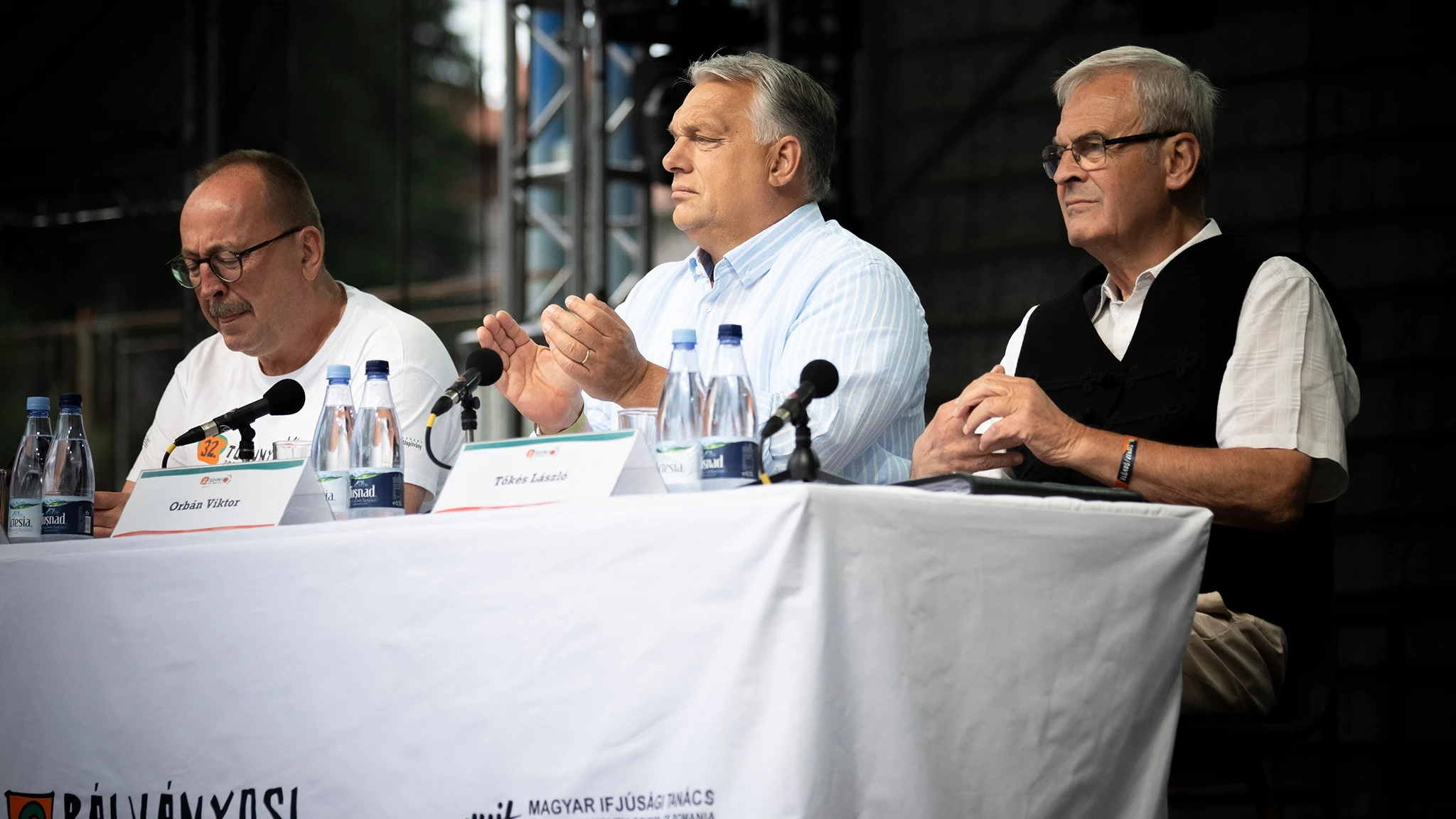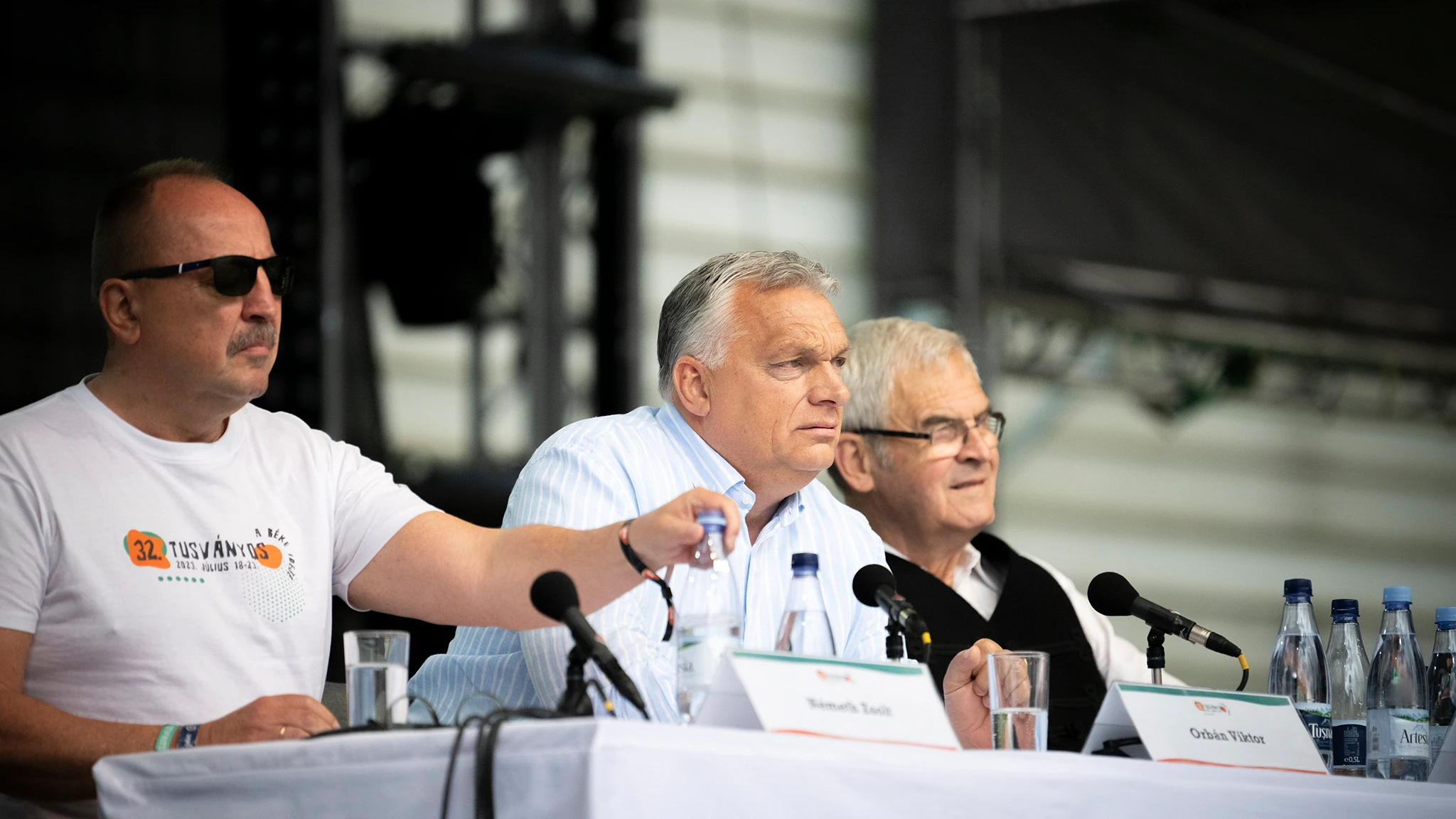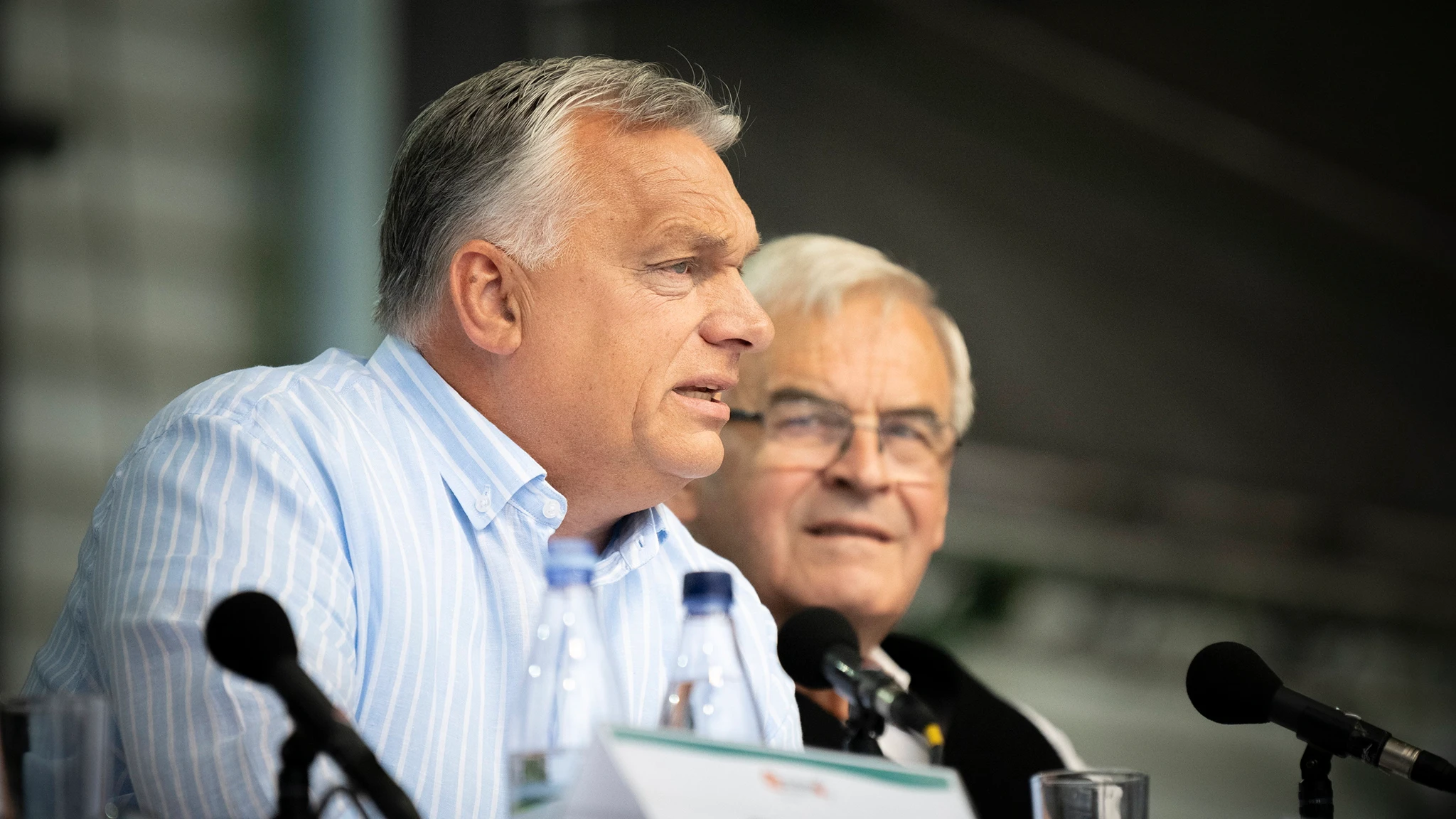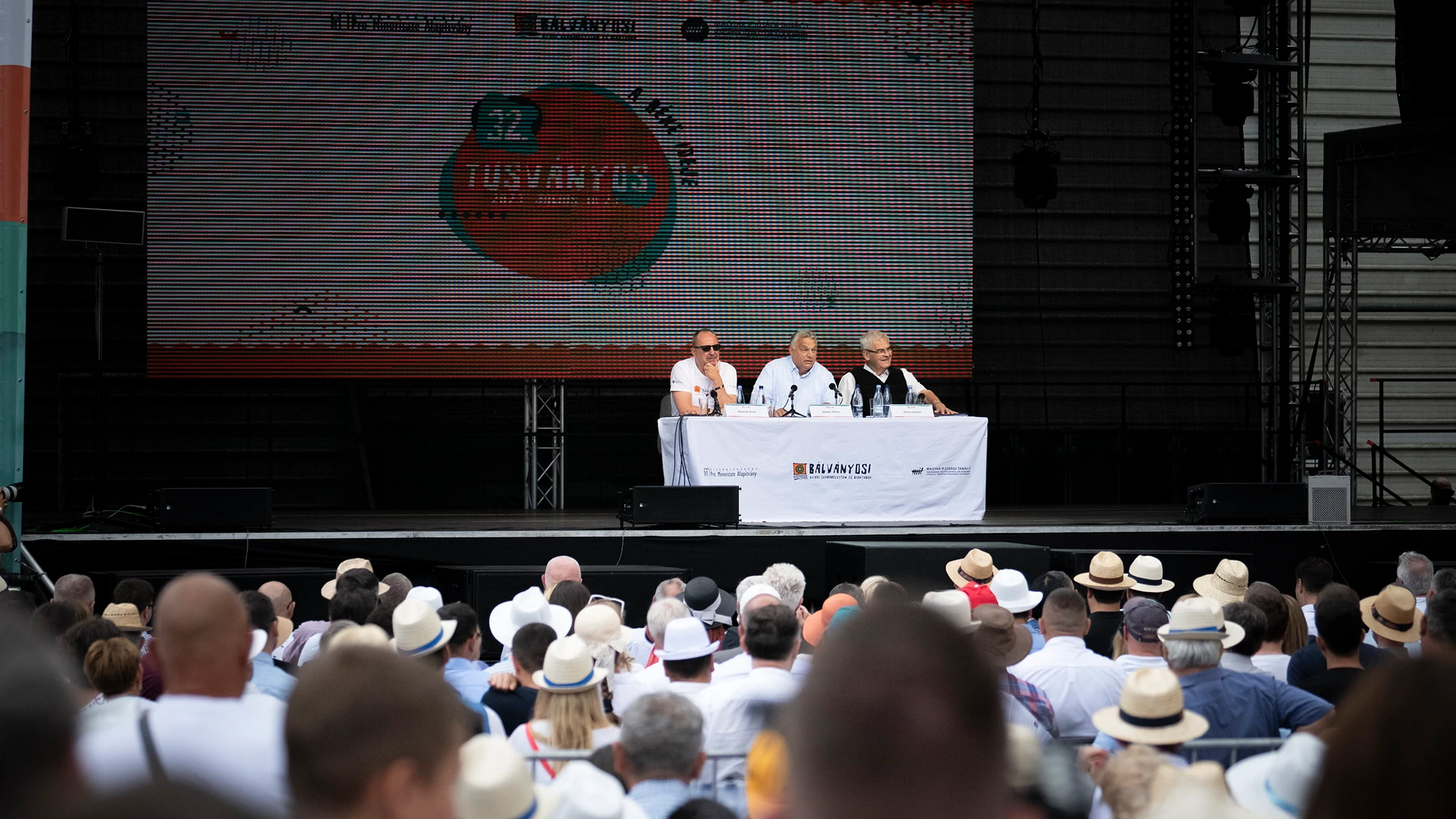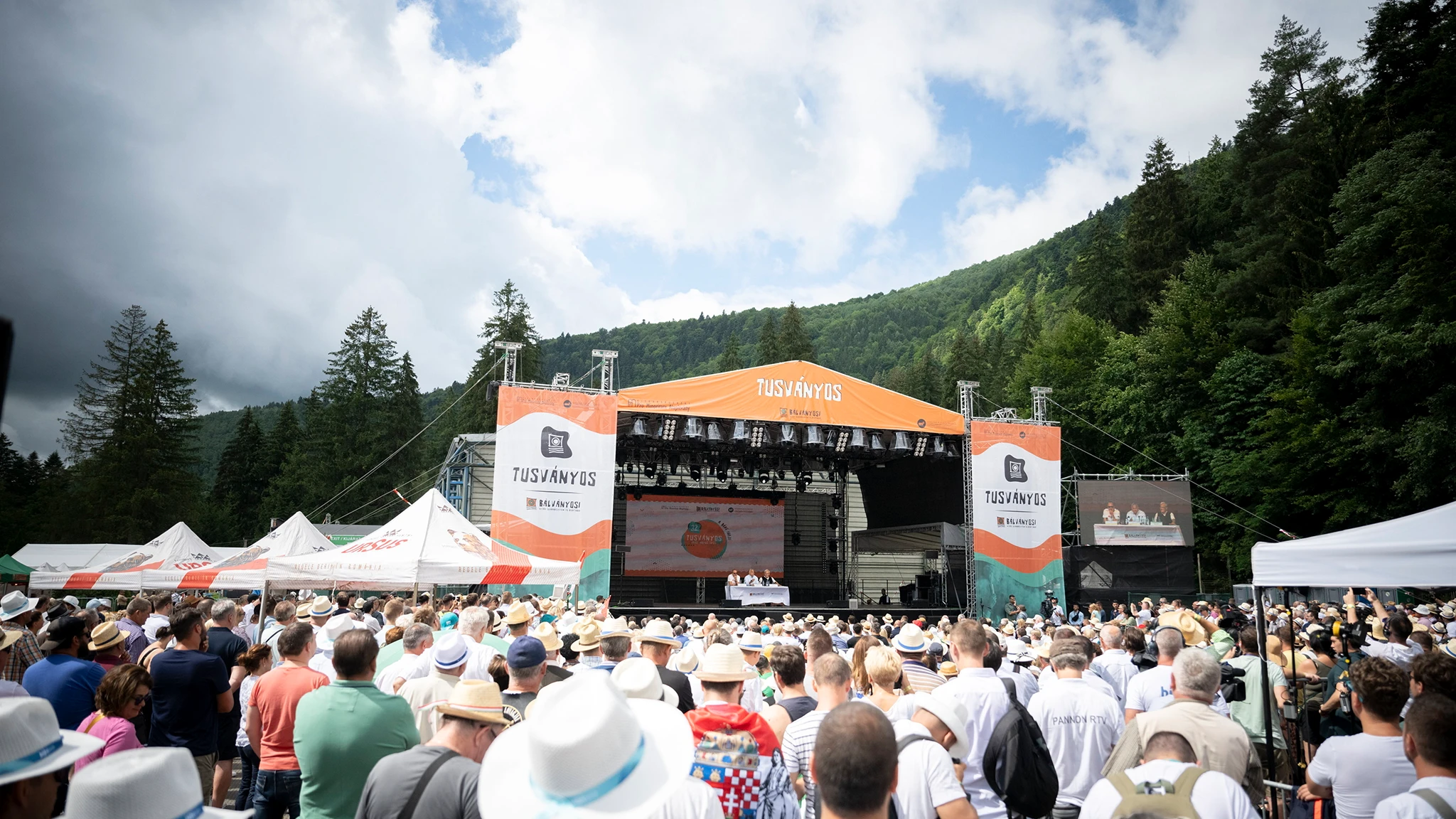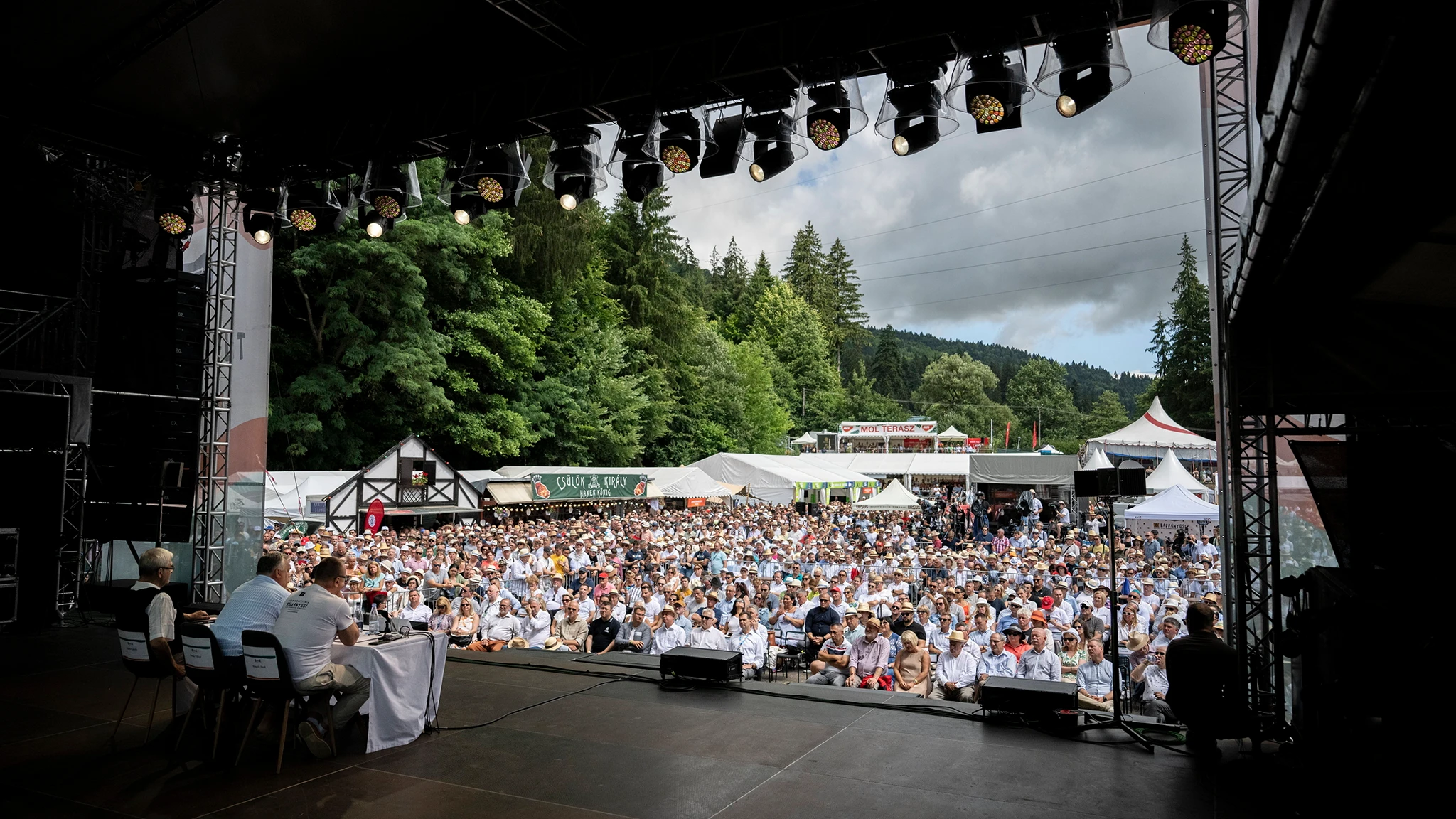Before an audience gathered together in front of the outdoor Petőfi Stage, the Prime Minister highlighted that “today Hungary, the Hungarian people and the Hungarian government are fighting and struggling hard to climb back from this diverted course onto the usual path that will lead us to 2030.” In his view, this could happen sometime in July 2024.
Mr Orbán hopes it is then that he will be able to state that in Hungary economic growth is significant again, bank lending is robust again, and we are again on a course of growth well above the European average.
He added that we were already past the most difficult period, and there was every chance that inflation might fall to below 10 per cent by the end of the year.
He also said regarding 2023 as a whole, it is to be hoped that it will be possible to avert a depreciation in wages, and the sky-high interest rates on loans could be brought back to an acceptable level in the second quarter of next year, at the earliest.
The Prime Minister further spoke about the fact that in 13 years the overall performance of the Hungarian economy has tripled, has increased from HUF 27,000 billion to HUF 80,000 billion, and our goal is to increase our GDP to HUF 160,000 billion by 2030.
He added that the new economic system that the government had been building for 13 years “has come together pretty decently and has also proved to do well.” Pro rata, we are doing well as far as our goals are concerned;” as regards our state of development targets, in 2010 we stood at 66 per cent of the European average, in 2022 at 78 per cent, and by 2030 “we want to reach a range between 85 and 90 per cent.”
Hungary’s energy import dependence is decreasing to plan, currently standing at 28 per cent, and by 2030, with Paks 2 and solar energy network developments, “we will want to reduce our electricity imports to zero,” he said. The government will spend HUF 11,500 billion on these projects.
Listing the results achieved, he said in 2010 employment had stood at 62 per cent, today it stood at 77 per cent, while for 2030 the goal was 85 per cent.
Regarding university developments, he highlighted that in 2010 not a single Hungarian university had been in the world’s top 5 per cent, while last year there had been as many as eleven such universities.
In the context of family support, he said the reproduction rate had increased from 1.2 to 1.5, but in order for the population not to decrease, we would need 2.1. “We continue to remain in big trouble, we must continue to mobilise all our strength and energy, all our resources, governmental-fiscal resources in the direction of family policy,” he said.
In Mr Orbán’s view, defence, too, is beginning to find its feet; Hungary is one of the few NATO Member States that is able to spend minimum 2 per cent of its annual gross domestic product on such purposes. We are likewise not doing badly as regards the programme for the unification of the nation up to 2030, the government has increased the relevant funds ten-fold compared with 2010.
In reference to the dozens of Romanian nationalists protesting at the entrance of the camp, but kept outside by the police, Mr Orbán began his speech by saying that “we arrived here, traversing armies of Romanians, but we would prefer to see them as some kind of reception committee, something we have good reason for,” because “in our struggles fought for Christianity, we weakened Latin Christians will also need Romanian orthodoxy.” He said he had received support material from the Romanian ministry of foreign affairs about what he is not allowed to talk about, what he is allowed to talk about and how, and “this is an official state document,” he added.
He highlighted that he had been advised not to talk about anything that might upset Romanian sensibilities, including national symbols. “I will not talk about them, but I’d like to welcome our friends who came here with Hungarian and Szekler flags,” he said.
He was further told he was not allowed to talk about collective minority rights, “I won’t talk about them either, but I will nonetheless state that these exist and are due to the Hungarians living here.”
He said he had also been instructed not to talk about non-existent Romanian administrative territorial units. They may have been thinking of Transylvania and Szeklerland, “but we never claimed that these were Romanian administrative territorial units,” he stated.
He stressed that there were issues he was allowed to talk about, but was not allowed to cast them in a negative light. These issues include western values. Today, western values mean three things: migration, LGBTQ and the war. However, “these need not be cast in a negative light, they appear in a negative light as a matter of course,” he pointed out.
He observed that he was additionally required to dispense with “xenophobic connotations related to migration, cited from a revisionist approach;” this amounted to something more like “communist time travel.”
Mr Orbán highlighted that if the Romanian president were to come to Hungary to deliver a speech, “we will not tell him what he’s allowed and what he’s not allowed to talk about.” The Romanians should take into consideration that “Hungary fully supports the present most overarching Romanian national ambition, Romania’s Schengen membership, and we would like to draw their attention to the fact that from 1 July 2024 Hungary will take over the presidency in the European Union, and one of the main objectives of our programme is to achieve Romania’s Schengen membership,” he stated.
He observed that Romania had a new prime minister, his twentieth Romanian counterpart, “a new prime minister, a new chance, perhaps, this might come to something that is mutually beneficial for the both of us.”
The Prime Minister also spoke about the fact that the world’s balance of power had shifted, and we were suffering from the grave consequences of this shift.
He highlighted that for 80 years after World War II, there had been a balance of power, and “for us Hungarians, this period consisted of two parts.” There was the first 45 years “when the British and the Americans threw us to the Soviet communists; I should mention just as an aside that in those days they were not so picky about the Russians as they are these days.” And there was a second period of 33 years when “we were able to live in freedom, without military occupation, Soviet Union and communists,” he said.
He stressed that for 80 years the world’s balance had not been upset because we had succeeded in phasing the Soviet Union out of history without a war. Now, however, China has shifted the world’s balance, he added.
He took the view that the current world political processes favoured Asia and China, be those about the economy, technological development or military force, for that matter.
“China is standing before us, fully apparelled as a great power,” he said. It has a civilisational creed, it is the centre of the universe, it has a long-term plan to make China great again, and it also has a medium-term programme to restore the dominance it had enjoyed before the arrival of the West in the region.
According to the Prime Minister, the greatest question is whether a clash between China and the United States can be avoided. In his view, a war is not unavoidable, but he said “the truth is that this is the business of the big boys, on this we haven’t been dealt any cards.”
“All we can say is that at this time we should do something unprecedented: the big ones should accept that there are two suns in the sky. […] The opposing parties should recognise one another as equal parties, regardless of how the balance of power shifts at any one time,” he said, warning at the same time that the setting of such a new balance takes an entire generation’s time, and the Hungarians must shape their plans in this “global time.”
Changing over to the situation of the European Union, Mr Orbán said we may have the impression that it is in a state of anxiety and feels entrapped.
In his view, the European Union perceives its position correctly, it is a rich and weak union surrounded by a rebelling world, “a chaotic racket, old injuries, many hungry mouths, brutal development, enormous consumption,” he listed, also mentioning the millions setting out for Europe.
He pointed out that the International Monetary Fund’s country list for 2030 forecasts that Britain, Italy and France will drop out of the top ten where they are today, and Germany currently ranked fourth will slide back to tenth place.
This is reality, he said in summary, adding that this fear, this sense of entrapment is diverting our European Union towards isolation, it is scared of competition. He likened the union to an old boxing champion who keeps showing off his championship belts, but no longer wants to enter the ring. This leads to isolation, to the EU locking itself up inside an economic, political and cultural ghetto which is referred to as ‘decoupling’ in the EU, the Prime Minister said.
In his view, the EU has also made such a ‘decoupling experiment’ vis-à-vis Russia, it has detached Russia from the European economy with the wartime sanctions. However, detaching Europe from Russian energy is a futile attempt because Russia cannot be detached from the rest of the world.
“Someone else will buy the Russian raw materials, and in the meantime, we’re suffering from wartime inflation and are losing our competitiveness,” he explained. He said before the Russian war, the amount paid for the European Union’s gas and oil imports, the two combined, was 300 billion euros; last year, it was 653 billion, meaning that today Europe wants to compete in such a way that it pays twice as much for the energy it needs, while in the rest of the world, energy remains available at the same price as before.
He pointed out that large European companies did not want to be detached from Russia. 8.5 per cent of the 1,400 largest western companies have withdrawn their operations from Russia, 88 per cent of their pharmaceutical industry have remained in Russia, 79 per cent of European mining industry continue to remain present in Russia, 70 per cent of energy companies have remained and 77 per cent of manufacturing companies are also maintaining their presence in the country. At the same time, in 2022, these western companies remaining in Russia paid 3.5 billion dollars in total into the Russian budget.
“Looking at it from this perspective, the attack that the Ukrainians have launched against our poor little Hungarian OTP is nothing other than a manifestation of Hungarophobia, and therefore we must reject it,” the Prime Minister laid down.
He identified the struggle between federalists and sovereigntists as another major process in Europe. In this, in the wake of Brexit, the sovereigntist V4 found themselves on their own against the federalist Germans and French.
According to Mr Orbán, the federalists are making every attempt to force the incumbent government out, they openly said they wanted a change of government in Hungary, “they even funded the Hungarian opposition, deploying every possible means of political corruption.”
“They’re now doing the same in Poland, and you should remember how they wanted to prevent the Meloni-led Right from winning in Italy.”
He said it is to be hoped that following the European elections due to be held in 2024 and the ensuing power position reshuffle, “there will be a balance of power situation in Europe more in our favour than the one we’re living in today.”
He said the federalists had launched an attack against the Visegrád Four (V4), “we all see the result: the Czechs have effectively changed sides, Slovakia is undecided, only the Polish and the Hungarians are holding on.” There is a chance for the camp of sovereigntists to grow, “I see a chance for that as in Italy such a government has been formed, there is something moving in Austria, while in Spain there will be elections tomorrow,” he added.
He said what is most important for Hungary is “to be clear and objective about ourselves,” we must bear in mind the path on which “we finally set out in 2010 after 20 chaotic years following the fall of communism.” We must not lose sight of the fact that “we have a new era which has equally intellectual and economic foundations,” he said.
He highlighted that the intellectual foundations were summed up in the Constitution, and the new Hungarian Constitution is a document which “most evidently sets us apart from the other countries of the European Union “as the liberal constitutions of other European countries are centred around ‘me’, while the Hungarian Constitution is centred around ‘us’.”
He said the starting point of the Hungarian Constitution is that “there is a place which is ours, it is our home; there is a community which is ours, it is our nation; and there is a way of life, or to be more precise, an order of life which is ours, it is our culture and our language.” Therefore, in the Constitution our intellectual starting point can be summed up in such a way that “the most important things in human life are those that one cannot obtain on one’s own,” he explained.
He stressed that one could not obtain peace, family, friendship, law and community spirit on one’s own, and neither could one obtain freedom on one’s own because “a person who is alone is lonely, not free.” All the good things in life are effectively based on cooperation with others, and “if these are the most important elements of our lives,” they must be protected by society and the legal system, he laid down.
Mr Orbán said these common elements appear in the individual’s life as attachments. “Therefore, the Hungarian Constitution is a constitution of attachment which seeks to strengthen these attachments, and therefore stands on the foundations of a culture of reinforcement.” At the same time, liberal constitutions, rather than seeking to reinforce, want to reject something in the name of individual freedom, he added.
He said the Hungarian Constitution “strengthens the place where our children will also live as our country, strengthens our identities as men and women because that’s what we call family, and also strengthens our borders because this is how we can tell whom we want to live together with.”
He highlighted that “we did not make a bad decision” in 2011 when “we created a new Constitution, a Hungarian national and Christian constitution different from other European constitutions” because since then “we have had the migration crisis on our necks which clearly cannot be managed on a liberal basis, and we also have here the LGBTQ gender campaign which we have since learnt can only be fought off on a communal, on a child protection basis.”
The failure of countries resting on liberal foundations is that they thought their old communities would be replaced by new ones; instead, however, we only see a peculiar kind of estrangement everywhere, he stated.
He said two hundred years ago, at the time of the Enlightenment, left-wing, internationalist intellectuals and political leaders with a liberal leaning thought that after rejecting religion and Christianity, an ideal, enlightened community would come into being which was based on the realisation of the common good, and would live a free life of a higher order according to recognised sociological and social truths. This is what they were hoping to achieve by rejecting Christianity and religion, but today one can see that this is a mere illusion, and “by having rejected Christianity, we have in actual fact become hedonistic pagans,” he pointed out.
The Prime Minister said the European Union rejects our Christian heritage, is conducting a population exchange through migration, and is waging an LGBTQ campaign against pro-family European nations. In Europe a political class has come into being which is not accountable to anyone, has neither Christian, nor democratic convictions. Therefore, “we have no choice; we love Europe in vain, it is ours in vain, we must keep fighting,” he stated.
He concluded that in Europe a special political class had come into being which was not accountable to anyone, had neither Christian, nor democratic convictions, and federalist governance had led to an unaccountable empire in Europe. Therefore, according to Mr Orbán, while we love Europe, we have no choice but to keep fighting.
“We don’t want everyone to have the same faith, we don’t want everyone to have the same family life, we don’t want everyone to participate in the same holidays, but we do insist that we have a common home, we have a common language, we have a common public sphere, we have a common culture, and this is the basis of the security, freedom and welfare of the Hungarian people, and so it must be protected at any cost,” he said.
The Hungarians will not make any compromise, will not back down in Europe, will persevere in their rights, and will not give in to either political or financial blackmail.
“On issues falling within the realm of tactical time or even strategic time we may, but on issues falling within the realm of historical time, we can never compromise,” Mr Orbán laid down.
Concluding his address, the Prime Minister summed up the tasks in hand as follows: “as regards overarching global affairs, we must keep our wits about us, in the world economy we must build connections, in the debates in the European Union we must keep fighting, in intellectual issues we must persevere, and in the unification of the nation we must remain immovable.”
“The Lord above us all, Hungary before everything else. Come on Hungary, come on Hungarians!” Mr Orbán said in conclusion.
